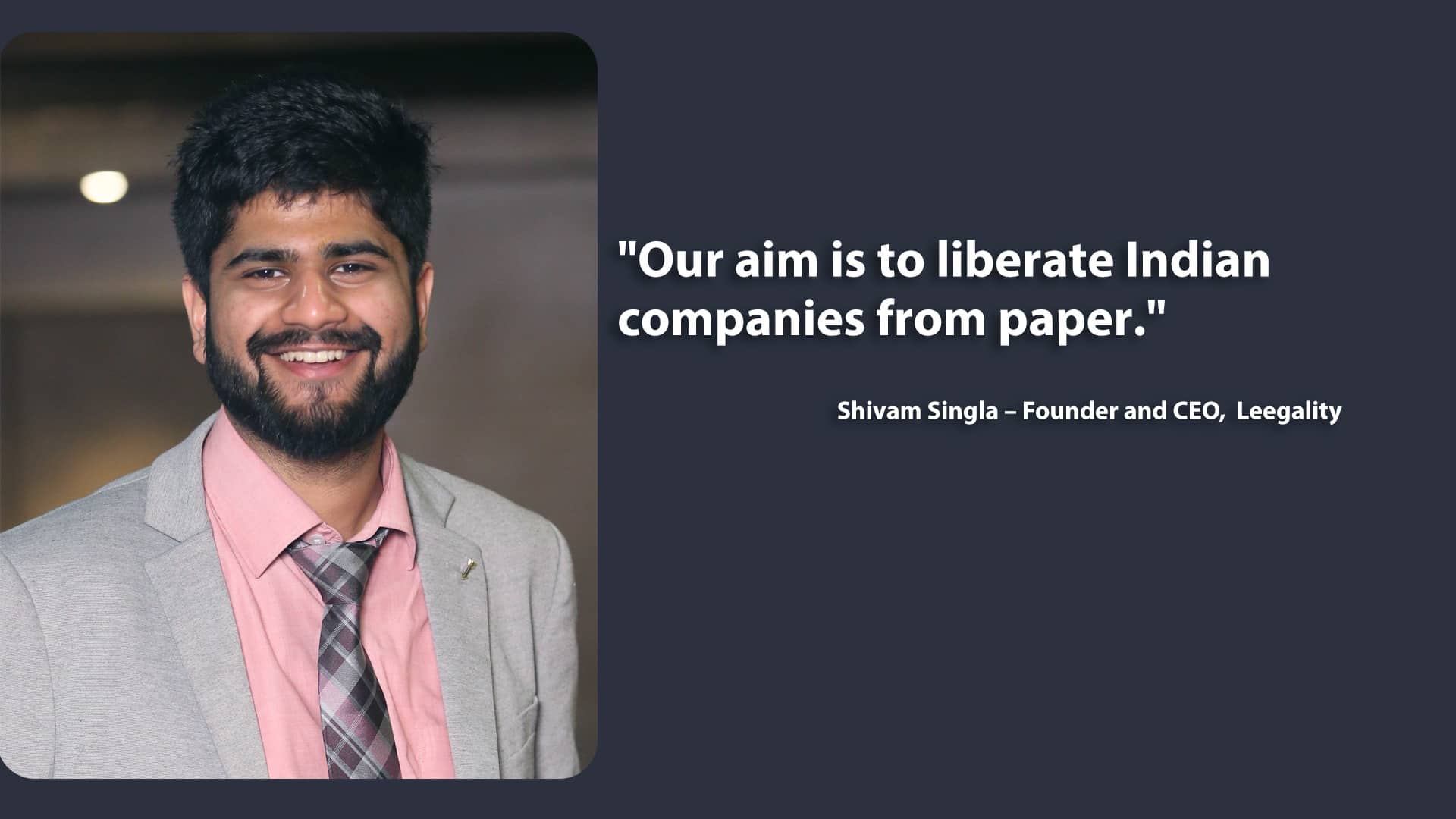In Conversation
How Leegality is enabling businesses to go completely paperless
The wave of digitalisation, over the last few years, has significantly changed how businesses are managed and operated across the world. Digital innovations like KYC, e-payment and e-shopping have not only created better operating models but also resulted in improved customer experience.
A law graduate from NLS Bangalore, however, found that signed paperwork despite being a critical part of almost every commercial transaction, has largely remained untouched by this digital revolution. In 2016, Shivam Singla launched Leegality with one stated aim- to liberate Indian companies from paper. Five years on, the document execution platform currently serves over 1,000 businesses across the country, including some leading names in BFSI space and fintechs and is planning to double its headcount to 100 by December. The Gurugram-headquartered firm recently completed its integration with National eGovernance Services Ltd (NeSL), a move that could potentially transform entire debt and insolvency ecosystem in the country.
Mr Singla shares his journey with The Plunge Daily and tells us how Leegality is enabling businesses to go completely paperless.
Q: Please take us through the journey of Leegality. Tell us about its evolution and the challenges you came across in these five years.
A: I established Leegality in 2016, when I was 22 years old, with one stated aim – to liberate Indian companies from paper. Signed paperwork is the critical foundation of all modern commercial transactions. Yet, unlike most other business processes, executing paperwork is largely a paper-based physical process. For businesses, this physical process is a huge logistical and operations challenge that causes delays, inconvenience and a bad customer experience. Our main aim is to solve for this digital final frontier.
Leveraging the IT Act, we have built a “made for India” SaaS solution that offers businesses a unified platform to sign and collect electronic signatures, pay stamp duty digitally and manage the other critical compliance and workflow aspects of document execution in a highly automated way. This offers companies a faster, easier and more secure way to kickstart commercial relationships with customers, business partners, employees and agents.
To draw an analogy – look at what payments gateways have done for the payments system today. Collecting or making a payment is so easy and smooth – we often take it for granted. We want to do something similar for paperwork. Through Leegality, signing, stamping and storing an agreement with your Bank is as fast (if not faster) as making a payment for your Swiggy order. We believe our vision is shared by the customers we serve.
We are already clocking in a revenue of approximately INR 1Cr a month and are seeing great traction. More than 1000+ Indian businesses use us to digitize their critical paperwork – from BFSI Majors like HDFC Ltd., HDB Financial, ICICI Lombard, Axis Finance, IndusInd BFIL, Federal Bank, Bajaj Finance, L&T Finance (among others) to start-ups like Razorpay, WeWork, Cars24, Udaan, Delhivery, Housing, Dunzo, Khatabook (among others).
Q: Please tell us about your products and how it has helped businesses overcome various challenges?
A: Our product is a “made for India” SaaS solution that offers businesses a unified platform to sign and collect electronic signatures, pay stamp duty digitally and manage the other critical compliance and workflow aspects of document execution in a highly automated way. It is built leveraging the IT Act in India.
A digital document paradigm offers several key benefits to businesses:
Speed: With digital flows processes that took days and weeks could be completed in minutes. Commercial relationships with customers, business partners, employees, agents and investors can begin faster.
Security: Electronically signed documents are inherently tamper-proof. Further, electronic documents can be stored safely with multiple backups available – safe from physical hazards like fire, water and other disasters. Finally, the law itself creates evidentiary presumptions in favour of electronic documents over physical documents.
Enhanced customer experience: A safer transaction for customers during the lockdown, and a more pleasant experience overall.
Operational Efficiency: Merely processing the journey of physical agreements (ensuring documents is prepared with 0 mistakes, tracking delivery status, following up with customer to sign, storing and inventorying the document safely) is a big load on teams within organizations. With digital paperwork – these touchpoints either get eliminated or become completely automated. This liberates teams from spending time on paperwork – and allows them to do more productive, meaningful work.

Leegality
Q: Please tell us about the major industries you are currently working with and which sectors are keen on working with you?
A: We are a horizontal solution and cater to all types of organizations. However, we have seen the most success with adoption from organizations with document heavy daily operations – like major BFSI institutions.
The BFSI sectors have been our top adopters so far. Consider the process for getting even a single document signed – from procuring the right stationary, to buying the requisite stamp papers, to printing and collating the documents, to filling information, to verifying information, to sharing scans, to sending couriers, to running office boys, to getting physical signatures, to verifying signatures & communicating approvals, till safely storing the documents In a physical room/warehouse.
And even once this process is complete – the document can become a pain to track down/retrieve months/years later when it might be need for enforcement or required for an RBI audit. For any BFSI organization – this process needs to be repeated many, many times during the course of a single day to keep business flowing. Depending on the size and the nature of the organization, this can easily mean hundreds, thousands and even lakhs of documents a year. And hence, this sector benefits the maximum from adopting digital documentation.
Also Read: How logistics-tech startup Vahak is reducing entry barriers for small players in transport industry
Q: Leegality has partnered with NeSL to provide a unified digital debt documentation for banks and NBFCs. Please tell us about this project How will an end user will get benefitted from this collaboration?
A: Leegality will offer Banks and NBFCs a “one-stop integration” that gives them access to the entire NeSL Digital Document Execution (DDE) and Information Utility Service Ecosystem.
NeSL is India’s first Information Utility. Under the Insolvency and Bankruptcy Code – it is mandatory for all financial creditors (i.e lenders) to submit their debt information and documentation to an Information Utility in order to invoke the IBC. The NeSL ecosystem provides a neutral digital infrastructure to execute and store documents in line with the expectations of the insolvency system. This has the potential to make IBC proceedings much quicker – which, in turn, helps creditors resolve bad debt faster. This will have positive spill-over effects on the corporate debt crisis in India.
Our integration allows Banks and NBFCs to:
- Plug into the NeSL IU and DDE ecosystem in a fast and easy manner – with minimal tech effort required
- Provide a one-stop solution for both debt and non-debt documents. Businesses can digitize all their paperwork in one go
- Comply quickly with the regulatory mandates that necessitate an NeSL integration
- Adapt NeSL with a customised service and support team guiding them through the entire process
Q: Please tell us about your team, business model, revenues and expansion plans.
A: We see a tremendous business opportunity in India. As per our estimates, the market size for eSign, eStamp solutions is approximately USD 5bn. And so, there is ample opportunity for growth.
Our aim is to grow the business by 10x over the next 2 years, by catering to organisations across different industries. We are strengthening our teams accordingly. In fact, by the end of this year, we are looking to double our workforce to meet the increasing demand among Indian enterprises and businesses for digitizing their documentation processes.
Unlike other tech companies – we have more than 7 former lawyers with prior experience at top Indian law firms (AZB, Trilegal, SAM, Keystone, JSA) working across our sales, marketing and product teams. Given that our product is a “legal-tech” product that solves a uniquely legal problem – the legal experience helps in many ways.
Our solutions are applicable to organisations across any industry, looking to streamline business operations and enhance customer experience – real estate, manufacturing, technology, retail, insurance etc. However, we find that organisations in the Banking, Financial Services and Insurance (BFSI) sector use our services the most owing to the sheer volume of paper-based transactions that they process as part of their daily business transactions. Depending on the size and the nature of the institution, the average number of documents processed can run into hundreds, thousands and even lakhs a year. Our eSign and eStamp solutions make this process much easier and faster – and more secure!
Q: Please tell us about the advantages of digital signatures over usual signatures.
From a legal standpoint – physical signatures are prone to fraud. Either through forgery, tampering – or more commonly – through consumers signing “blank forms” when availing financial services. Digital signatures are computationally impossible to forge. Further – if a document that is digitally signed is tampered – all parties get notified of the tampering whenever the document is opened.
From an operational standpoint – physical signatures require an entire logistics and operational process. Documents don’t magically appear in the hands of customers and business partners – you need to maintain an entire set of operations to actually move the document back and forth. This causes significant delays, high costs and a terribly tedious and sapping experience for all involved. Digital signatures, on the other hand, provide a bridge to a world where it is possible to build a digital workflow for your documents. It is important to note that digital signatures simply by themselves don’t accomplish this – but without them it would be impossible to accomplish!
Q: Covid turned out to be a major enabler for a lot of tech-driven firms. Please tell us about the challenges and opportunities that came along with the pandemic.
A: COVID-19 and lockdowns have accelerated the pace of tech driven change. People who shied away from adopting technology now jumped onto the digital bandwagon without a second thought. This was especially true for businesses. Organisations moved critical business functions to the digital realm to enable business continuity and continue operations uninterrupted. And this was a tremendous opportunity for us.
As companies saw the benefits going digital (cost savings, operational efficiency, wider reach etc.), they understood that digitizing documentation was key to smooth business operations. This made it significantly easier for organisations to understand the advantages of using our solution.
Also Read: Agritech startup Gramophone raises USD 10 mn for expansion
Q: There seems to be a huge market opportunity for digitisation. Please tell us how you see this landscape changing in four to five years and how optimistic you are about this change.
A: The perspective on what digitization means is changing. Earlier digitization was simply looked at for its own sake – as an end goal. But increasingly – businesses are adopting a deeper perspective – where they see that digitization of key processes can actually drive tangible business benefits – both for them and their customers. We are well positioned to thrive in this environment – because we offer a digital transformation of a critical process that causes significant business problems today. Businesses who wish to move to seamless business flows will need to evaluate digital paperwork – whether now or a few years down the line.
Q: In July, Leegality raised pre-Series A funding led by IIFL Securities. Please tell us about your investors and what makes them bullish about you.
A: Like I mentioned earlier, COVID-19 and lockdowns have accelerated the pace of tech driven change. People who shied away from adopting technology now jumped onto the digital bandwagon without a second thought. This was especially true for businesses. Organisations moved critical business functions to the digital realm to enable business continuity and continue operations uninterrupted. And this was a tremendous opportunity for us.
Our investors have been strong advocates of our offerings as they can visualize a future without paper. They (more now) understand how cumbersome it is for organisations to stay paper-based. They fully trust in us to grow leaps and bounds over the next few years.











































Pingback: This fintech startup is changing the game in India's microlending space
Pingback: This startup is using IoT to make Indian homes energy efficient